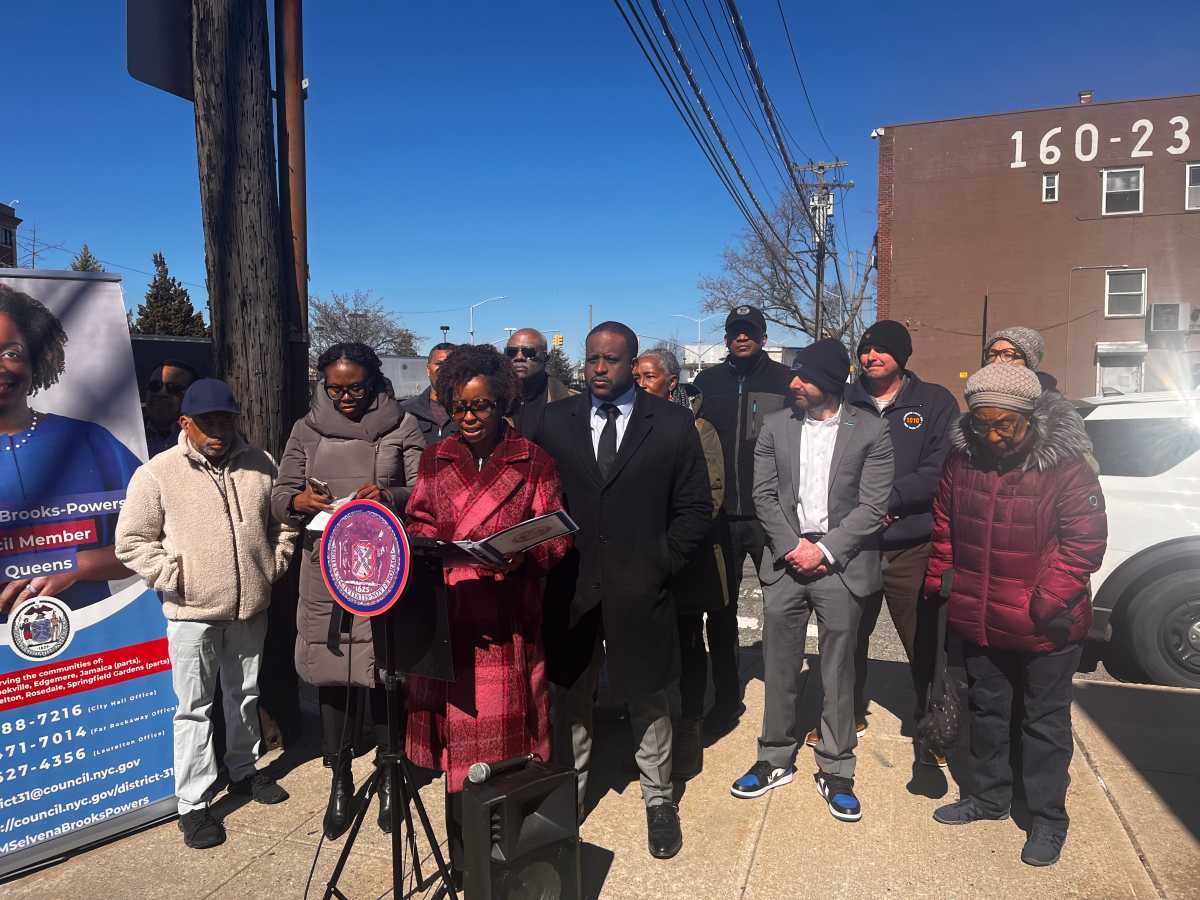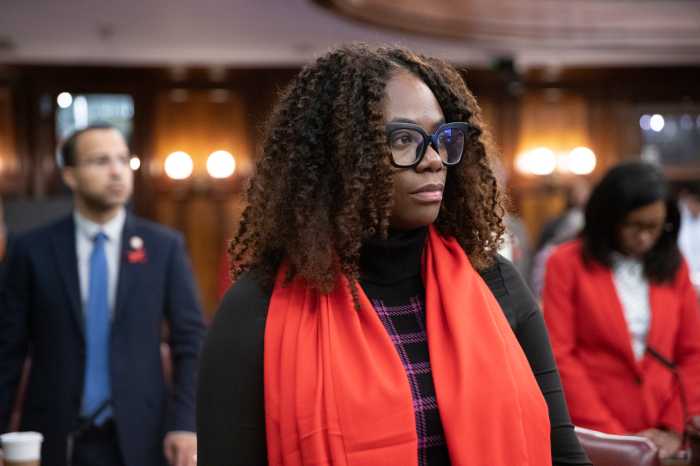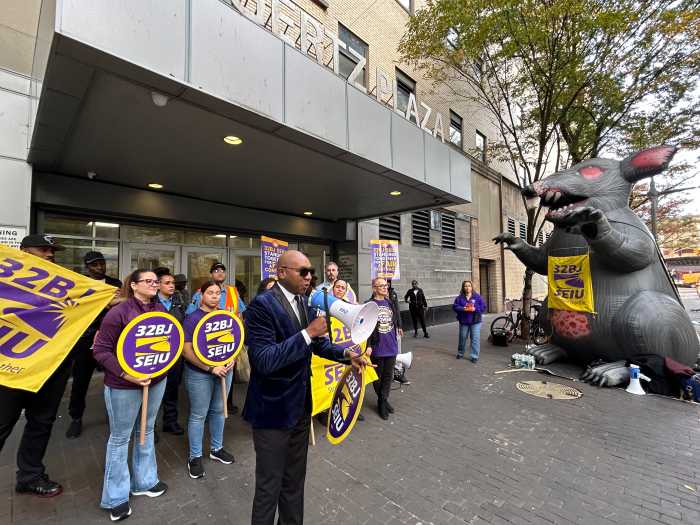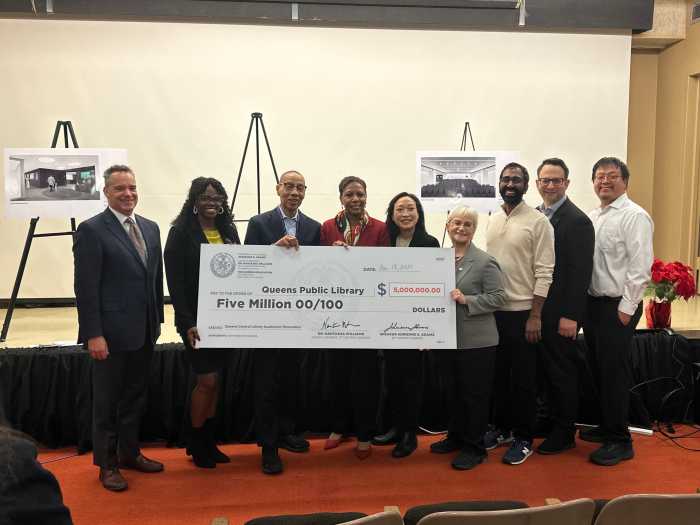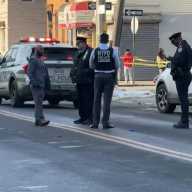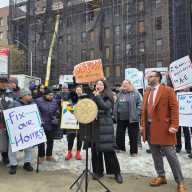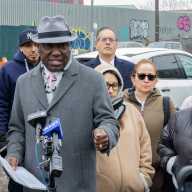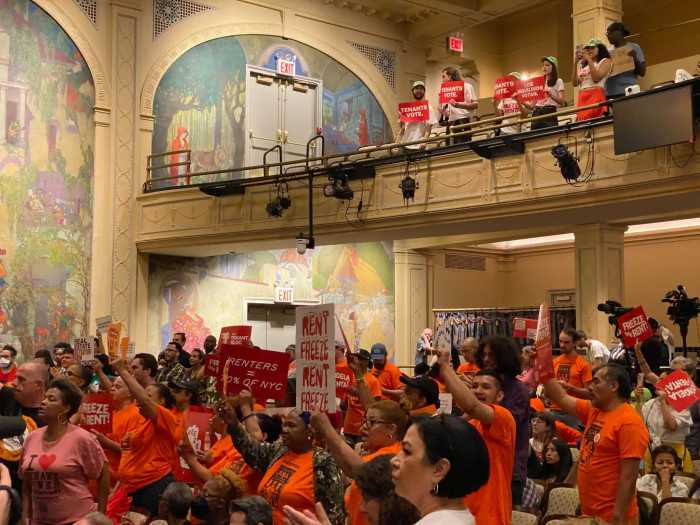Southeast Queens elected officials are slamming the NYC Department of Transportation (NYC DOT) for not including the area in a recently launched commercial truck parking pilot program.
Council Members Selvena Brooks-Powers and Nantasha Williams held a joint press conference on Thursday off Rockaway Blvd and 144th Terrace, rallying community leaders and advocates to demand that Southeast Queens be included in the city’s Overnight Truck Parking Pilot program.
Brooks-Powers and Williams said that the DOT must take action to increase truck enforcement in the area. According to the council members’ reports, last week, the DOT announced the Overnight Truck Parking Pilot without consulting stakeholders in Southeast Queens or including any Industrial Business Zones (IBZs) in the community.
The Overnight Truck Parking Pilot is a metered parking option for commercial vehicles, including large tractor-trailers, in select IBZ zones. This year-long pilot was created to improve parking compliance and minimize overnight truck parking in residential neighborhoods.
Three IBZs were selected for this program: Flatlands/Fairfield IBZ in Brooklyn (Flatlands Avenue from Erskine Street to Fountain Avenue), Hunts Point IBZ in The Bronx (Ryawa Avenue from Manida Street to Halleck Street), and Maspeth IBZ in Queens (56th Road from 43rd Street to 49th Street).
For years, parts of southeastern Queens surrounding the JFK Airport have dealt with issues caused by illegal truck parking and abandoned and derelict commercial trucks, RV trailers, and cars.
Many of the main corridors plagued with illegal truck parking include parts of Rockaway Boulevard, Brookville Boulevard, Springfield Boulevard, and around the Van Wyck Parkway.
Brooks-Powers emphasized that southeast Queens will not be ignored when addressing illegal truck parking. “For far too long, illegal truck parking has disrupted life in Southeast Queens. Given our close proximity to JFK Airport, our streets have become makeshift truck depots, with drivers parking overnight in residential areas. Idling engines pollute our air, and oversized vehicles create safety hazards for pedestrians and drivers alike. The people in our community deserve better,” Brooks-Powers said.
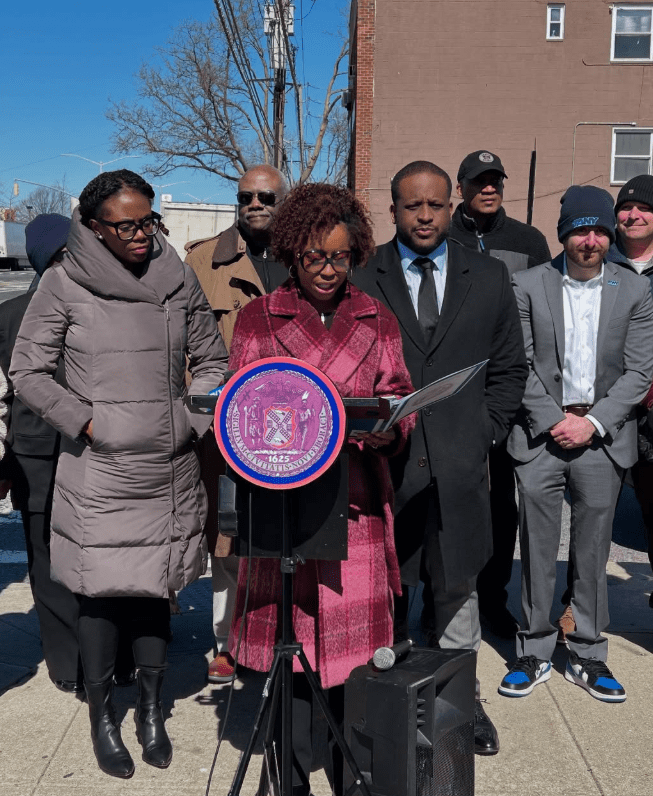
Brooks-Powers called the exclusion of Southeast Queens “completely unacceptable,” adding that she only learned about the program through news reports. She added that she has since reached out to the DOT to express her concerns. “We are not against a truck parking pilot; we are against a truck parking plan that excludes communities most impacted by illegal truck parking,” she said.
“Our message today is simple; we need real enforcement against illegal truck parking and real solutions for legal truck parking,” Brooks-Powers added.
Brooks-Powers said that these solutions include expanding the pilot to include Southeast Queens’ IBZ, increasing truck enforcement in residential areas, and working with local stakeholders to create long-term parking infrastructure.
Williams said that she was particularly frustrated about the lack of inclusion in the Overnight Truck Parking Pilot because she introduced a bill in Feb 2024 that has similar guidelines to the pilot program. “As a member of Southeast Queens, I introduced this bill because I wanted to try and find a comprehensive solution to a persistent problem in our community,” Williams said. “So I am actually quite confused as to why my community was not included in this pilot. This bill really is important in expanding the creation of an overnight truck parking area across the city where trucking parking is a problem,” Williams said.
Williams explained that Intro 0099 would establish overnight parking hours in IBZs for commercial vehicles. Between 8 p.m. and 6 a.m., only commercial vehicles would be permitted to park in such overnight parking areas.
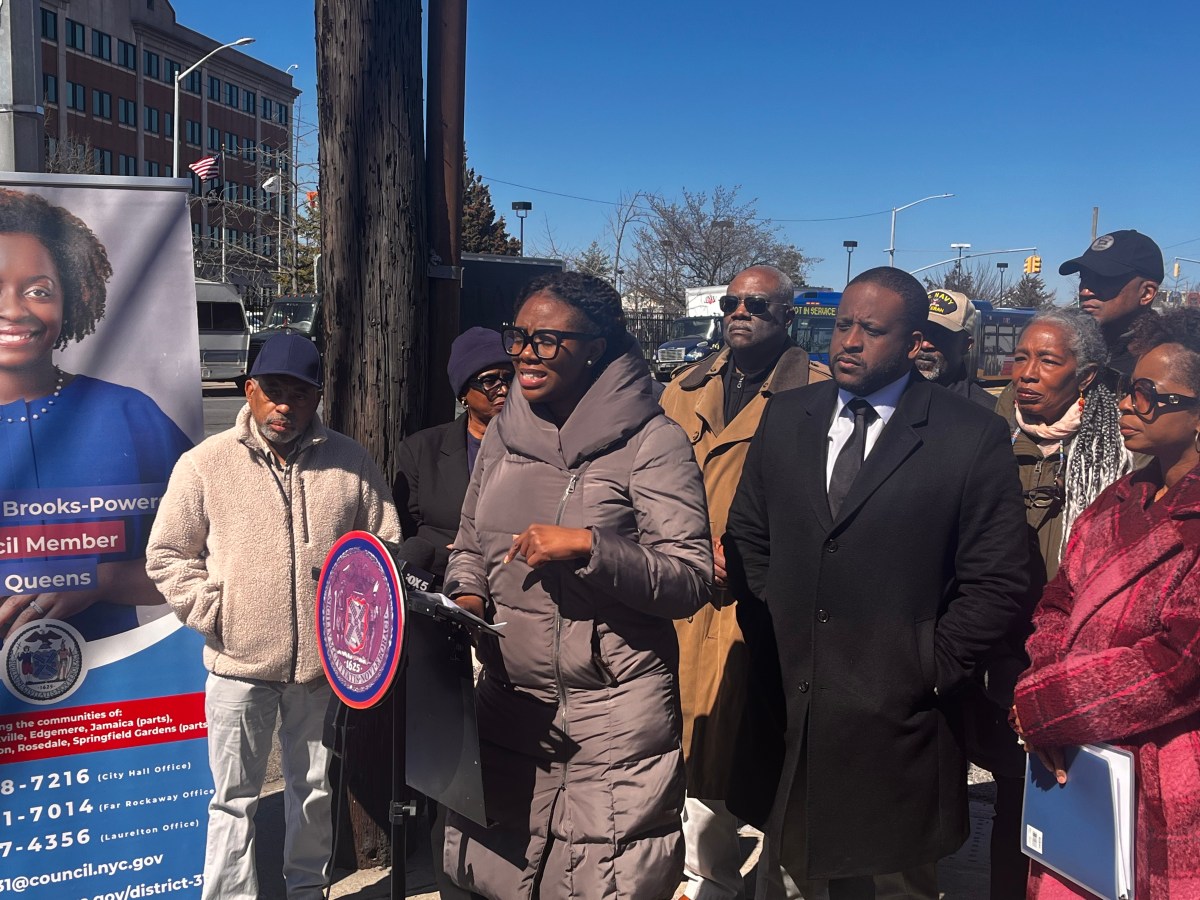
The overnight only restriction in Intro 0099 is intended to prevent daytime parking needs and discourage long-term vehicle storage. “This is actually a persistent issue where we come up with these ideas; they take it and run with it, but they don’t even execute or implement it in the way in which it is intended,” Williams said.
The lack of available parking spaces also creates issues for truck drivers who deliver materials to the commercial parts of southeast Queens, including businesses in the Gateway JFK BID.
James Johnson, executive director of the Gateway JFK BID, said that with the BID being located right outside of JFK Airport, there is no other location in Queens that has more cargo, truck, and commercial traffic. “We are asking for something simple. The Department of Transportation dropped the ball. I don’t know how they did not see this location or locations in Southeast Queens to have the pilot program,” Johnson said.
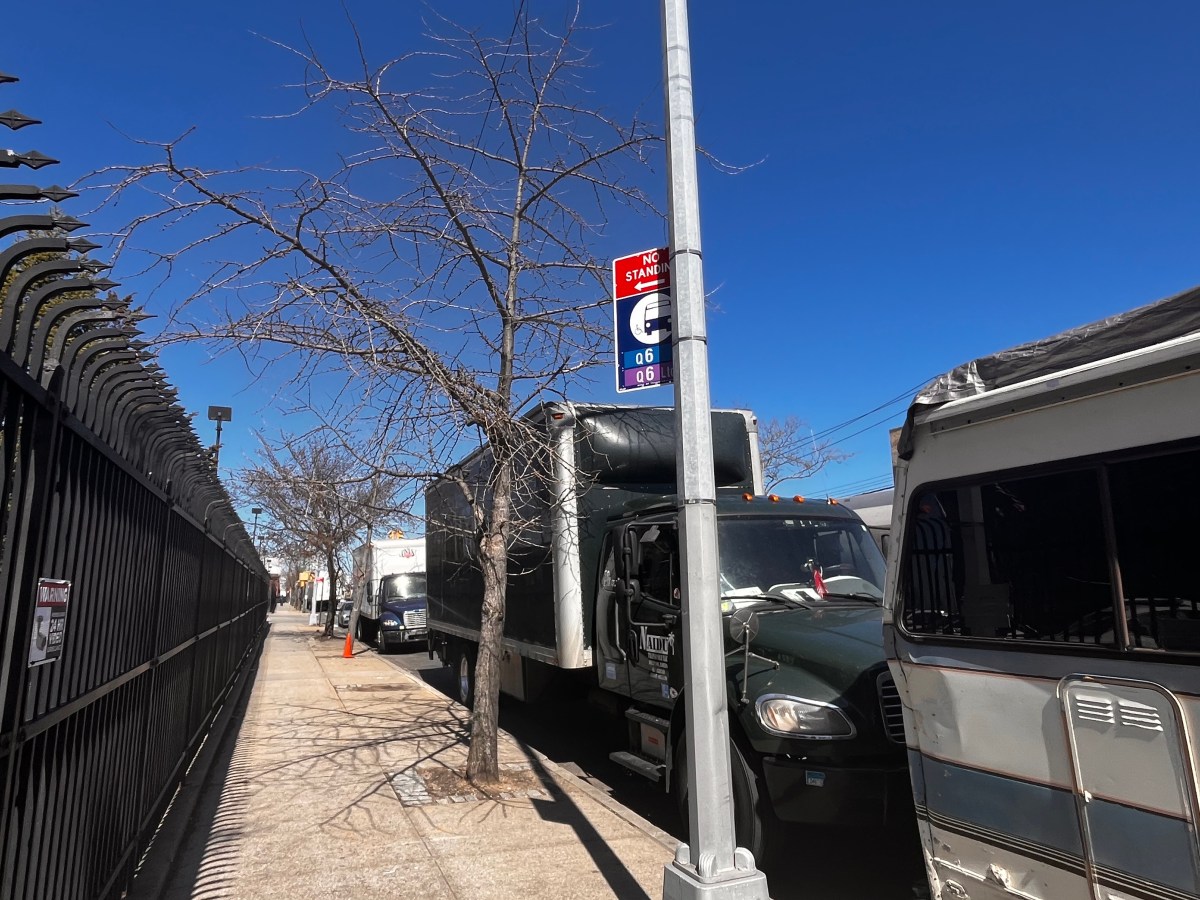
Last June, Johnson spearheaded a cleanup initiative with the NYPD and Department of Sanitation to remove over 30 abandoned, derelict vehicles, including cars, commercial trucks, RVs, tractor-trailers, and school buses, from the 113th Precinct side of Rockaway Boulevard and the 105th Precinct side of Guy R. Brewer Boulevard.
Despite the successful initiative, Johnson said that more needs to be done to combat the ongoing parking issues.

Zach Miller, vice president of government affairs at the Trucking Association of New York, explained that there is already a shortage of safe overnight parking facilities, which has a huge impact on truck drivers.
Truck drivers’ hours of service are federally mandated, and they must have a place to rest as they can drive 14 hours after a 10-hour rest period. Miller explained that with electronic hour logging, there is no wiggle room for drivers who are running out of hours and are looking for places to park. “Now with the electronic, if you are up against your hours, you must shut that vehicle down, or you will be put out of service, which forces them into a lot of really bad situations,” he said.
Miller added that with the Southeastern Queens residents facing bad actor drivers, it hurts overall community relations. “That hurts the image of truck drivers, truck drivers who are doing the right thing and want to be good neighbors and good partners. In addition, they don’t even have a place to park here,” said. “ It takes up space, frays relationships, and at the same time, you’re still not creating the opportunity to comply and operate safely.”
In a statement to QNS, a DOT spokesperson said the agency is aware of and working on the freight challenges in Southeast Queens.
“NYC DOT selected an initial set of locations in close proximity to industrial areas to avoid legalizing the parking of large trucks in front of New Yorkers’ homes and small businesses. We are aware and working on the freight challenges in Southeast Queens—including supporting a dramatic expansion of truck parking at JFK—and will review any proposed locations from local officials for a pilot expansion,” the spokesperson said.
According to officials, Southeast Queens has unique freight challenges as there are few spaces for overnight truck parking to be legalized without designating spaces outside local businesses and homes. In 2015, the DOT helped open the city’s first truck parking facility in JFK, and in 2023, the Port Authority announced plans to triple the size of the space in the JFK area.
The office of Mayor Adams also started Operation Heavy Duty Enforcement in August 2022 to target illegally parked commercial vehicles in Queens.
Residents share their concerns
Residents of Laurelton, Rosedale, Jamaica, Brookville, and Springfield Gardens have cited safety, environmental concerns, and other quality-of-life issues connected to the vehicles.
During the rally, longtime residents spoke about the impact of commercial trucks illegally parked in the area and, at times, abandoned near their homes on their quality of life.
Gloria Boyce Charles said her family has been living in the area since 1975. Boyce Charles raised concerns about illegally parked trucks being a safety hazard for children crossing the street. “Children are not safe in a community where trucks are parked all along our boulevards, and they can’t even see how to cross from one side of the street to the other to get to school or to the park to play,” Boyce Charles said.
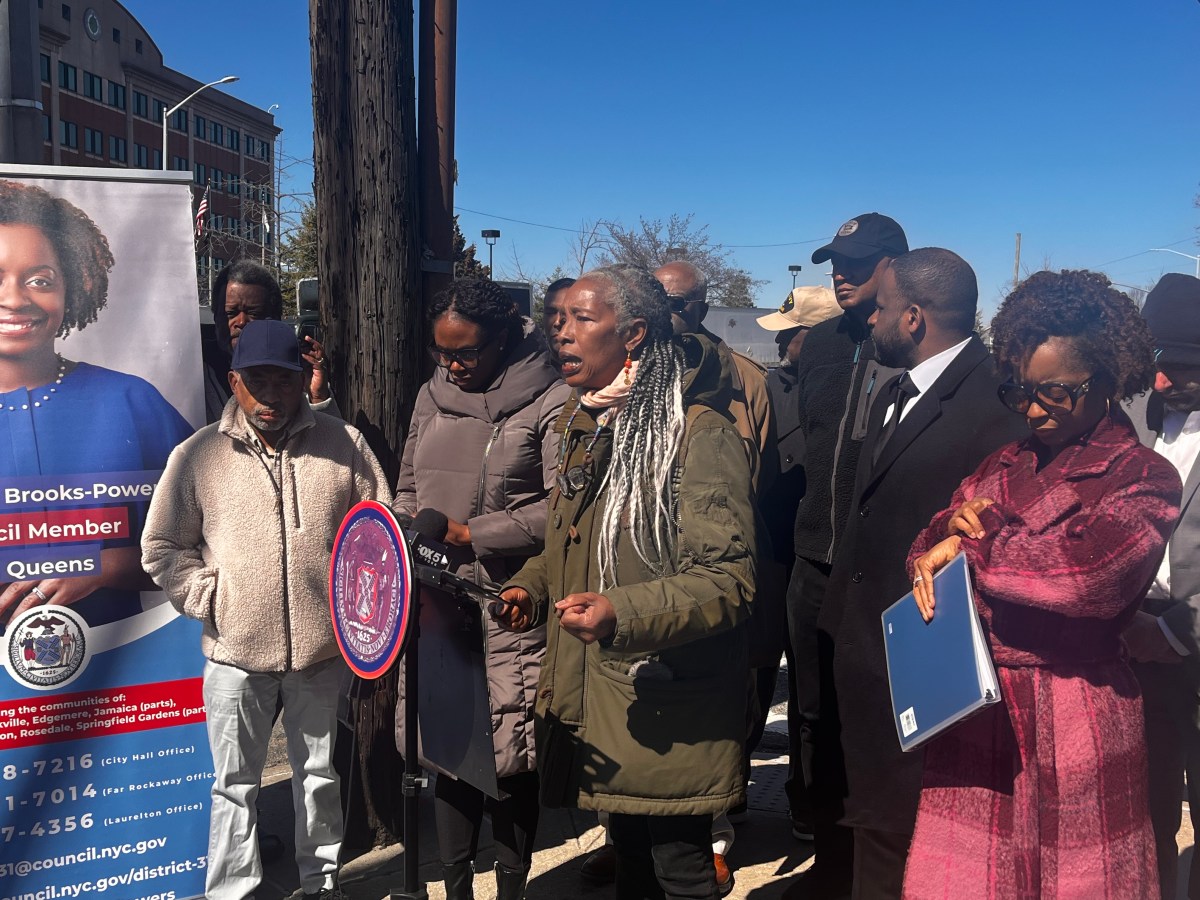
Emissions from trucks and other commercial vehicles are also a concern. “We have communities where trucks are either parking or traveling all day long, and the emissions from those trucks are so harmful to the people who live in those communities,” she said. “It’s an injustice to people who pay their taxes and their mortgages and want to live in peace and dignity. It’s an indignity, and it’s disrespectful, and something needs to be done. There’s no reason as to why Southeast Queens should not have been included in this pilot project.”
“You walk through this community, and you see trucks parked blocking people’s driveways, some of them between houses, and that’s a hazard in itself,” said Joyce Denny, president of the United Neighbors Civic Association.
Business owners speak out
Navin Jaimangal, owner of PSI Atlantic Seafoods, said that illegally parked trucks have been an issue for his business for the past 10 years. “We have trucks that come to pick up or come to deliver goods to our location; they can’t get in sometimes and get proper parking because the streets are filled with derelict vehicles that have been sitting there for months and sometimes years,” Jaimangal said.
Jaimangal said that he’s had drivers tell him that they can’t drive into New York because there is no parking and no space to offload their vehicles.
He added that Southeast Queens’ exclusion from the program is a “slap in the face.” “ This is Gateway JFK, where all the cargo comes through the airport, and all of the cargo handling companies are around the airport,” he said. “If anything, this should be the center of this program because we have the most volume of trucks, we have the base problems we have, and it is also a mix between residents and businesses,” he said.
At the Rockaway Plaza Delicatessen, manager Mary Kim, 57, said that illegally parked trucks had affected her customer base of truck drivers. “These truck drivers would stop by, they would get breakfast and lunch… they lose their spots, and with no more spots, thats bad,” she said.
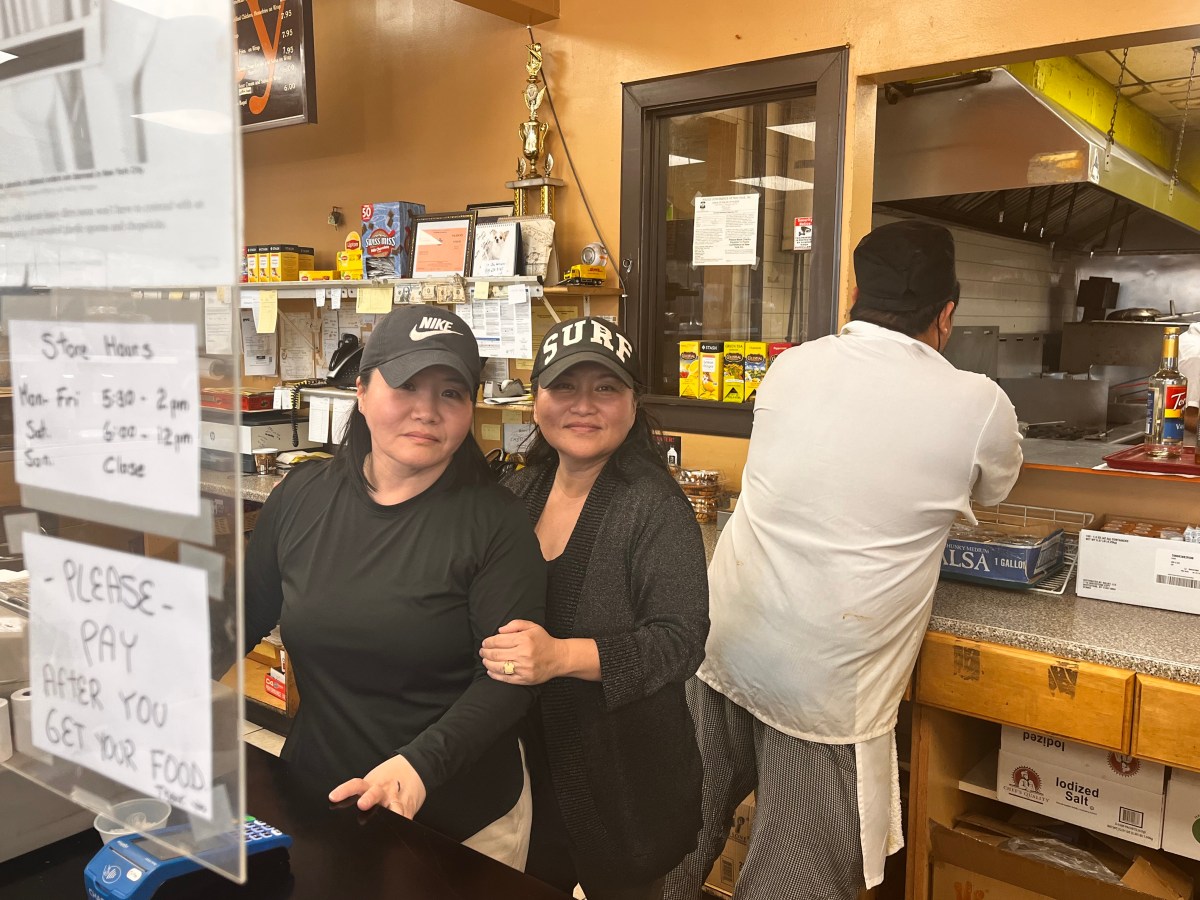
Kim said that over the past year, fewer drivers have stopped by as it is increasingly difficult for them to find parking. “It started with one or two trucks; now it’s all lined up, and now there’s no way for my truck-driving guys to stop in,” she said.

